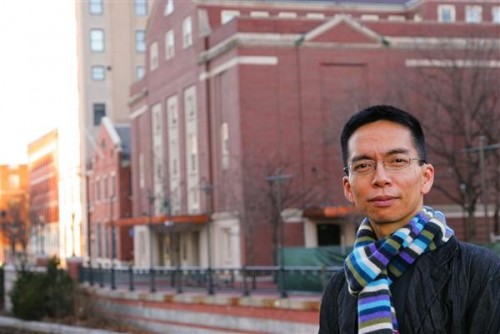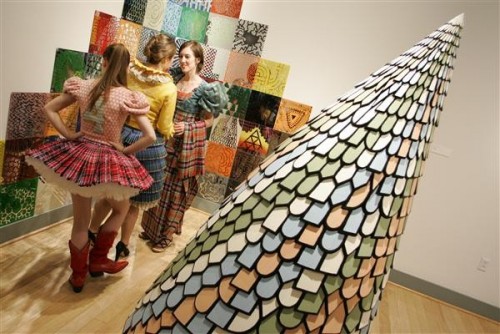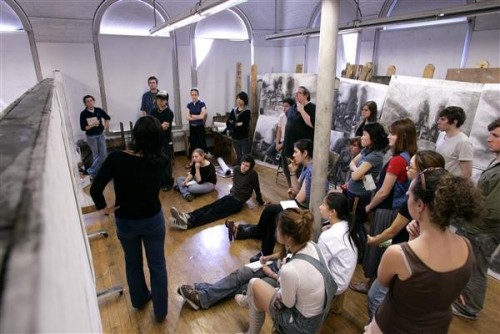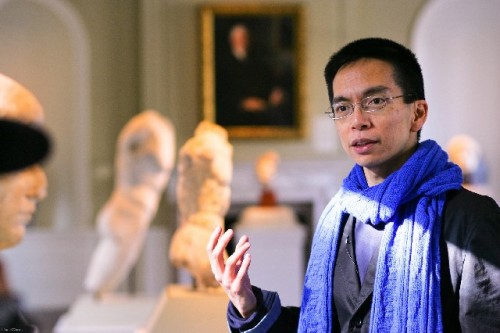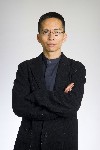Creative Humanist President John Maeda Leads Rhode Island School of Design in 21st Century
Integrating Art, Education and Technology
By: Mark Favermann - Nov 11, 2009
Since it was founded in the 19th Century, the Rhode Island School of Design (RISD) has always been a place to admire for its artistic focus, no nonsense approach to developing creative practitioners, and sense of aesthetic and educational mission. RISD has been a magnet for creative individuals to pursue their muse. Some of its former students have achieved fame and even wealth. Also, many of its faculty members have been distinguished and accomplished in their own right. RISD's laurels are many.However, times change and a great school can only rest on its laurels for a short amount of time. With this in mind, the thoughtful and even sensitive RISD board of trustees chose an individual to lead this august institution in the formative decades of the 21st Century. John Maeda exemplifies the times, the school's aesthetic, and RISD's continued educational mission.
The choice was superb. The trustees found a rare individual, John Maeda. He is one of those unusually articulate polymaths, a Renaissance Man, who is a world recognized artist/graphic designer, computer scientist, and educator. His career reflects a philosophy of humanizing technology. Maeda's work synthesizes technology, education, and the arts into an innovative 21st century creative model.
He assumed the presidency of RISD in June of 2008. Maeda champions the strategic role that artists and designers play in the furling of the creative economy. Mr. Maeda's vision for RISD is to underscore the school's emphasis on critical thinking and critical making (on making tangible objects by hand) as relevant to our increasingly digital world.
As RISD's president, he is working hard to connect the institution to the political, economic, social and business spheres. He considers these areas of untapped potential for artists and designers to make a real difference. In order to ensure the broadest possible access to a RISD education, Maeda has made fund raising for scholarships a top priority.
Maeda was born and raised in Seattle, Washington. He earned both a bachelors and masters degree in computer science and electrical engineering from MIT. He received his PhD in Design Science from the University of Tsukuba Institute of Art and Design in Japan and an MBA from Arizona State University.
His early work seemed to redefine the use of electronic media as a tool for expression. He combined skilled computer programming with more traditional artistic technique. This laid the groundwork for the interactive graphics that are almost ubiquitous and prevalent on the web today.
Maeda has exhibited his digital art in one-man shows in London, Paris and New York. He is a trustee of the Smithsonian's Cooper-Hewitt National Design Museum and on the Design Advisory Board of Proctor and Gamble. He has also designed projects for major companies like Cartier, Google, Philips, Reebok and Samsung among others.
He was a professor at MIT for 12 years and served as associate director of MIT's Media Lab. A widely admired international lecturer, Maeda has published four books. The most recent, The Laws of Simplicity, is translated into 14 languages.
In 2008, Esquire magazine named John Maeda one of the 75 most influential people of the 21st Century. He was given a National Design Award in 2001, and he received the Mainschi Design Prize in Japan in 2002. In 2005, he was given the Raymond Loewy Foundation Prize in Germany.
In a recent conversation with Maeda, he made several provocative and deeply felt comments that underscore a balanced view of art, design and technology and the need for human expression and experience. His mission for RISD is to have the creative hand and the use of technology in synch. The brain and heart, as well as head and hand must be combined for innovation and creativity.
A question entailed a survey that he participated in concerning impressions of the elegant Bento Box. This is a Japanese, single-portion takeout, or home packed meal. It is generally colorfully arranged and consists of rice, fish or meat, and pickled or cooked vegetables in a box shaped container. The most beautiful examples are handcrafted in lacquered wood.
He recognizes the Bento Box as a visual surprise. One opens the box and sees the beautiful arrangement of elegant foods. He evokes a Bento Box by saying that RISD's box includes not five or six items but a variety of over twenty elements including painting, sculpture, glass, fabric, architecture, etc.
His overriding art perspective for RISD is one that humanizes technology. To him adding technology is like adding more red paint to a painting or adding structure to a sculptural form. In a period that can be likened to a trust in technology similar to just before the Titantic sunk because of a blind faith in technology. He views technology as a tool rather than an end unto itself.
Maeda sees the artist/designer as welcoming the push/pull struggle between technology and artistic statement. From this struggle comes a process that initially includes disorientation, unbalance, frustration or disappointment; then creativity, innovation and perhaps greatness. He sees the struggle that freshman at RISD endure during their core course as a window on this process.
President Maeda sees this period of limited financial resources in the economy as an opportunity for RISD. He feels that business schools and technology schools have not been able to offer enough to corporations and industry. They are beginning to look at creative schools for their strategic use of limited resources (Doesn't the artist make use of limited resources to survive?), critical thinking and critical making. To Maeda, the critical making is the key to advancing in the 21st Century. He sees corporate support as a financial resource to RISD. Corporations and major industry players are becoming partners with RISD.
He also emphasizes the artist and designers need to touch, literally feel and experience the work they are involved in. This is not the approach of most business types, scientists or engineers. He sees the loss of handedness as a major weakness in an overly technological culture. Artists and designers develop this handedness. This as an aspect of educational integrity. The human touch, the humanization of technology used as a tool kit is the best direction. For Maeda, artists and designers have a hand-based knowledge. This a uniquely creative and very human skill. Significantly, applicants to RISD must submit hand made drawings as part of their portfolio.
Maeda also sees artists and designers as individuals who not only look for answers but more importantly seek questions. In our time of economic downturn, certainly industry needs great questions to be asked. President Barack Obama has stated that the United States needs an emphasis on STEM--Science, Technology, Engineering and Mathematics. John Maeda counters this by saying, " There is an equal need for IDEA--Intuition, Design, Emotion and Art. IDEA is a clear set of actions that can articulate our notion of a creative economy."
"Arguably, STEM and IDEA present two sides of the brain, left and right, a yin and yang for the future. They both ask questions and can develop answers but in very different ways. Together they can lead to comprehensive and more sensitive problem-solving." But, he suggests, "The creative artist and designer have always been able to work with less rather than unlimited resources. Their creativity and innovative thinking can lead directly to accessibility and affordability."
Historically, artists and designers have been undervalued and marginalized. This seems to have been apparent during the last several decades dominated by investment bankers. Maeda sees a need for artistic leadership to emerge. He is interested in fostering a sense of leadership among the students at RISD. Maeda says, " There is an agility, a flexibility, to the artistic mind. Their DNA allows for creative leadership that can be built into our overall culture, balancing technology with humanism, art with science."
This notion has several examples throughout history. Most recently, the playwright and poet Vaclav Havel was the first president of the Czech Republic after the fall of Communism. Maeda wants artists and designers to be put in positions of strategic leadership. RISD's role in the future will include educating leaders. " I see artists as leaders of industry, government and education," he said.
When asked about a possible merger of adjacent Brown University with RISD to help share resources in a diminished economy, President Maeda emfatically stated, "Not under my watch."
John Maeda is a special person. He is an important person who is working to make a societal and cultural difference. The trustees at RISD got it right. He is the real deal: the right person, in the right place, at the right time.



